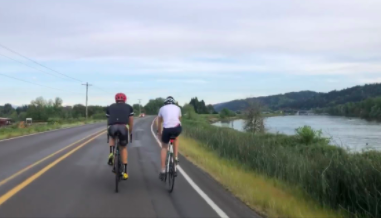English 9 Guest Series: Staying happy and healthy through trying times with athletics
By Bradley Edington ‘23 and McKenzie Compton ‘23
Now, more than ever, we need athletics in our lives. There is no better way to stay happy and healthy during quarantine than exercise. We'd like to illustrate our personal experiences with athletics and health, as well as its impacts upon everyone's physical and mental wellbeing.
Personal Reflections:
By Bradley Edington:
Working out has always been the highlight of my day. Whether it's been rowing, biking, or running, my mood improves. It's time set aside, time where I can stop thinking about the stresses of life, and just relax my mind. The second I step into the boat or start a ride, it seems as if my stress floats away. In these time periods, I often find myself in meditation. I acknowledge and accept any and all thoughts or feelings that come, and letting them go without judgment. My awareness of the world around me enhances, as all distractions flee. My perception of my mental state and its importance improves and my overall joy skyrockets. Focused on one instant, one stroke, one turn, everything gets a little better.
I was recently asked by a coach who I’d be without sports. If I broke my leg on a run, and couldn’t compete, what would my identity be? The question stumped me because athletics are at the core of my life and I often depended on them for happiness. It took me a long while to come up with a suitable, genuine response. It came to me while I was erging in my driveway about two weeks later, as I was throwing my head against the question. My mind calm and clear, I was able to understand who I was and find an answer. Through athletics and movement, I was able to adapt as a person.
McKenzie Compton:
The past couple of months, I have been learning quite a lot about myself, as well as coming to terms with the anxiety I currently struggle with. This was a hard pill for me to swallow, even though I had been suspecting something like this for a couple of years. Something that is especially hard for me is change, and so consistency and routine is something I crave and is necessary for me. I believe that there is nothing more consistent than your own body. Although, obviously, your physical self can experience changes, the feeling you have in your own skin is something that remains constant, as well as the feeling of exercise and physical movement. Another benefit I often associate with physical movement is a happier, or at least more stable, mood. While I don’t always feel happier after I exercise, I feel calmer, like the constantly racing thoughts are finally being quieted. This is extremely essential for my “survival,” as I can then make better decisions, avoid high anxiety, and am just generally better able to regulate my mood.
Something else that has also helped me with confronting the truth about my own mental illnesses was reading about the multitude of other high performance athletes who also struggle with anxiety or depression. For a long time, I treated therapy and mental illnesses as a sign of weakness; I thought that I should be strong enough by myself to deal with what I was going through. I thought I could never achieve anything great, athletically or academically, if I accepted the fact that maybe there was something wrong and I should talk about it. But hearing stories from professional athletes, people who were clearly succeeding in life, showed me that in some cases what I was dealing with didn’t have to be a weakness or hindrance. I think that I work my hardest at times when I’m really feeling the struggle with whatever is happening in my head.
Because I often look to exercise as a way to work through whatever I need to, when I’m at my worst, working out becomes an extremely positive thing in my life. I seek the purpose, the goal, of simply improving my strength and endurance. It doesn’t require a lot of thought; it’s like meditation, but not as quiet and emotionless. I can be angry, sad, stressed, anything, and be able to let that out by working my hardest, instead of just sitting there with my thoughts. Exercise, and activities such as soccer, running, and climbing, have had a huge effect on who I am today, as well as contributing to keeping my headspace relatively manageable, while also serving as a great outlet for letting out every single type of emotion I might experience.
Both:
Maintaining mental and physical health during quarantine, and other turbulent periods, is paramount to being successful during, and post, COVID-19. In an age of phones and computers, virtual reality and video games, where the average teenager spends over seven hours a day on a screen, we have never been more out of touch with reality or our physical world (ABC News). While stuck in quarantine, it's easier than ever to let our health standards go as we watch our screen time tracker climb higher and higher. However, through exercise and physical movement we, as human beings and members of larger global community, can thrive physically and mentally, as well as stay connected with each other and with our world.
Though relaxation and limited physical movement may feel like a positive action in the moment, there are many consequences to your choice, physically and mentally. Working out can seem daunting or exhausting at the time, but we guarantee that you will begin to feel better if you just go for it. Making use of one’s physical body is necessary in order to survive in times like these, as it forces you to be in the present moment, similar to meditation, and has incredible benefits for mental and emotional health. In addition to this, exercise makes your body stronger and boosts your immune system, a key aspect of staying safe during the COVID-19 pandemic.
Bradley:
Physical exercise and body movement is required to maintain one’s health, coming in the form of meditation and mental healing. In my experience, doing long stretches of cathartic exercise improves my cognitive ability and my mental state. Doing a repetitive motion, like cycling, rowing, and running, is a simple task and does not require an extensive amount of brain power. We are forced to stay in the moment, preventing us from worrying, planning, or expecting. This is often an accepted feeling as it’s a break from the stresses of life. When exercising, staying consistent with your effort and timing day by day is important: repetition is a very calming, soothing, and welcomed feeling. For example, most like waking up at the same time everyday or eating the same breakfast every morning. We crave consistency and routine, as it makes us feel safe.
Yet, this relation within exercise is not only fun and relaxing. Movement improves your clarity and thought process as well. According to Health Direct, an Australian government-funded health advice center, “Exercise pumps blood to the brain, which can help you to think more clearly. It increases the size of the hippocampus, the part of the brain responsible for memory. It also increases the connections between the nerve cells in the brain. This improves your memory and helps protect your brain against injury and disease,” (Health Direct). The cognitive advantages ever present, it is without doubt that one's mind will be clearer after regular exercise. Through healing, strengthening, and meditation, there is no doubt that being stuck in one moment improves your mental capacity and mental wellbeing.
McKenzie:
Exercise not only forces you to be present in the current moment, it also improves your mood, and can make you an overall happier person. Many people say they experience this phenomenon, and can describe for themselves the feelings they associate with physical movement. There is also scientific proof to back up these claims. Chemicals like serotonin and endorphins, neurotransmitters that cause “happiness” in the brain, are released during, and after, physical movement. Exercise is often recommended as a way to combat various mental illnesses, such as anxiety and depression, and there’s a reason for that. Not only will it trigger the release of those neurotransmitters, but exercise often has a positive effect on the hypothalamic-pituitary-adrenal (HPA) axis, an anatomical structure that regulates our stress response. This is why many people find themselves calmer after periods of physical movement.
Beyond the scientific explanations, there is also an emotional, almost spiritual, element affected by exercise. In times like these, it's easy to feel like we’re drowning in a deluge of hopeless, and frankly depressing, information. With various media constantly all around us, it’s easy to start to feel panicked, sad, or cornered by all this bad news. When I start to experience these emotions, I often turn towards exercise as a form of distraction, or a break, from the continuous influx of information. As previously mentioned, physical movement forces you to be in the present moment, and this has the amazing side effect of making it very hard to worry about anything other than taking that next step, or doing that last pushup, or just holding on a little bit longer in whatever you're doing. The burning in your muscles makes any other thoughts fade to the background. Exercising can be a place of calm, and also a place to release emotions in a positive way.
Completing a workout can also feel like an amazing victory, especially if it was something you had never accomplished before. A simple win such as this can leave you with a more confident and calm emotional state, especially because humans are hardwired to crave completion. Even if you feel like you can’t get anything right, setting an easier workout goal, and then fulfilling it, can give you that sense of accomplishment that can motivate you to work hard in other areas of your life as well. Exercise literally has brain-changing benefits, and can alter your mood and perception of yourself, and the world around you, for the better.
Both:
Beyond everything we’ve addressed so far, all of our reasoning, our most convincing and relevant argument is the fact that exercise will help protect you from COVID-19. During this pandemic, the most important action we can take is doing our part to keep our communities healthy. The best way to do so is to build up both our immune system, and our physical strength. This can be achieved through movement and physical exertion. The consensus among many people is that there’s not really anything you can do to personally prepare your body for COVID. There are lots of guidelines for prevention, such as wearing a mask, and social distancing. However, we haven’t heard much on the topic of improving our own physical health.
Yet according to Harvard Health, the two main categories of people more at risk are those who are over the age of 65, and those who have a chronic medical condition on the list released by the Center of Disease Control (CDC). On the surface, if you fall into one of those categories, it may seem like there isn’t anything you can do to prepare your body against COVID. But diving a little deeper, and exploring why it is that older people are more susceptible, can reveal that your health during this pandemic is in your control. Some of the diseases listed to increase your risk against COVID are heart disease, high blood pressure, and diabetes. All of these ailments can be partly prevented through exercise. Obviously, it would take a long period of time regularly working out to actually have an effect on these diseases, but that just goes to show that physical movement and labor isn’t only necessary during a disaster. It should be a cornerstone habit in anyone’s life, if only for the many health benefits it offers.
Elderly community members are also more at risk due to their exhausted immunity system, weakened after decades of use. Regardless of age, however, exercising is proven to boost your immunity system, and is generally known as “one of the pillars of healthy living” (Harvard Health). With a higher rate of physical movement in their life, these at-risk men and women will be more prepared and insured if sickness hits, a welcome turn of events after devastating losses all around the world.
With a pandemic at our doorsteps, most of us have never needed to be as sharp and at peak performance as right now. In today's world, staying mentally and physically positive is the best way to stay clear minded and happy, while also increasing immunity to disease and infection. Without physical movement, there is no doubt that people would be at more risk, with lower moods and mental capacity. Operating at full extent is key to staying sane in times like these, and a human cannot accomplish this without bodily movement. According to neuroscientist Wendy Suzuki, “exercise is the most transformative thing that you can do for your brain today,” but we want to take it a step further by saying that it is the most transformative thing you can do for yourself, period. So go on that run, that bike ride, even that walk, that you've been saying you’ll do for the past week. Trust us, your body and brain will thank you.







